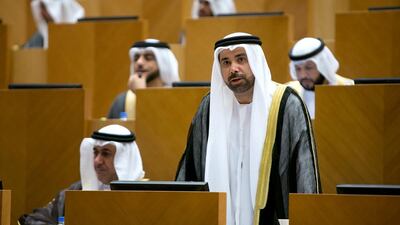ABU DHABI // The appointment of a new Central Bank governor will not affect an upcoming FNC debate on the UAE’s banking system, says a council member.
In September, Mubarak Al Mansouri, the chief executive of the Emirates Investment Authority, succeeded Sultan Al Suwaidi, who had been the head of the bank since 1991.
“The change will not affect us,” said Ali Al Nuaimi, an FNC member from Ajman, and rapporteur of the council’s finance and economy committee.
“Mr Sultan had great expertise and worked well for the economy and the whole banking industry. He had a good effect on the economy. I wish him the best. But now with the new governor, we hope to work with him for the greater good of the nation.”
Mr Al Nuaimi said he did not know Mr Al Mansouri personally but he had heard “many good things about him”.
The finance and economy committee has been preparing the report on the Central Bank for about a year. It examines banking sector legislation and calls for legal reforms that outline protection for bank customers.
The FNC is awaiting the attendance of the new governor before debate can begin.
Mr Al Nuaimi had said that four existing laws that regulate the banking sector were decades old and in need of reform.
According to the report, bank customers are not being given all their rights because the Central Bank has been lagging behind other countries in ensuring bank customers’ rights.
Mr Al Nuaimi said neither the Central Bank nor the consumer protection office at the Ministry of Economy had been properly reviewing contracts drawn up by banks.
The contracts usually benefited the banks far more than their customers, he said.
Bank customers also no longer enjoy account insurance, which is common abroad and was provided in the UAE during the global financial crisis. Mr Al Nuaimi said having account insurance would help to encourage expatriate workers to keep their money in the UAE, and reassure bank customers that their money would be safe should any problem arise at their bank.
The report also found that a law passed in 1985 that requires a higher authority to oversee Sharia compliance has yet to be enacted. As a result, Islamic-banking customers were being neglected.
The finance and economy committee also examined the UAE’s policy of pegging the value of the dirham to the US dollar.
After discussions with government officials, the committee found that the Central Bank had not been carrying out regular studies on how the US dollar affects the UAE.
“Maybe at some points it [the US dollar] had its advantages, but then there are problems because of the tie between the two currencies,” Mr Al Nuaimi said.
For instance, a decline in the US currency’s purchasing power would lead to higher inflation in the UAE.
A possible alternative, he said, was to move gradually towards pegging the dirham to the value of metals or a basket of currencies.
osalem@thenational.ae

